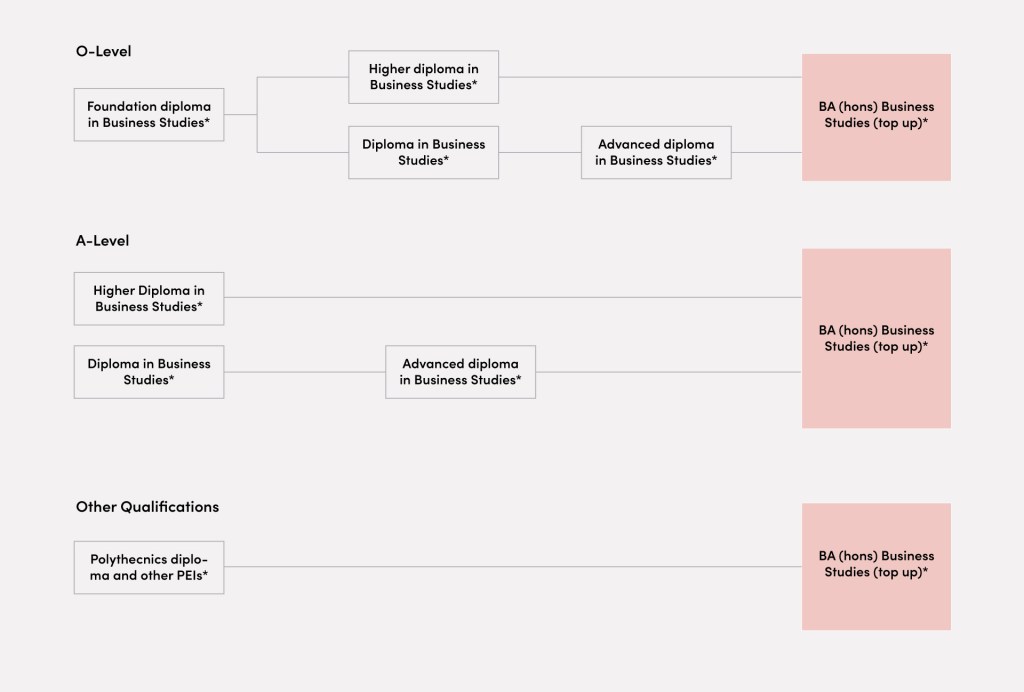
OVERVIEW
About This Programme

The Bachelor of Arts (Honours) in Business Studies (Top-Up) equips students with the knowledge and skills needed to succeed in today’s dynamic business environments. Covering key areas such as strategy, marketing, finance, and management, this bachelor degree with honours develops strong commercial awareness and analytical abilities.
Designed for diploma holders and working professionals, this BA in Business Studies offers a pathway to advance academic and career prospects through practical and applied business knowledge. Graduates gain expertise in interpreting data, devising strategies, and measuring performance effectively, ensuring they are well-prepared for managerial and leadership roles. Upon successful completion, students will be awarded a bachelor degree in business studies top up by the University of Greenwich.
Ranked Top 7% Globally by Center for World University
8 month | fulltime
12 months | part-time
fast track degree
Practical and theoretic modules
Guided career sessions
MODULES
Designed to explore beyond subject knowledge
The Bachelor of Arts (Honours) in Business Studies (Top-Up) curriculum equips students with the tools to thrive in complex business environments. Modules develop commercial awareness, analytical thinking, and creative problem-solving skills, enabling students to interpret data, formulate strategies, and assess organisational performance effectively.
Graduates acquire strong interpersonal and organisational skills, allowing them to collaborate effectively, engage diverse stakeholders, and communicate complex ideas confidently. The programme also integrates technology-driven learning to enhance efficiency and accuracy. Students gain practical experience across core areas such as marketing, finance, human resources, and strategic management—providing a comprehensive foundation in bachelor of business studies subjects.
Small Business Development
This module is designed to provide students with practical and academic insights into small business, enterprise, and entrepreneurship. Students will apply their knowledge by developing and presenting a business idea and completing a comprehensive written business plan.
Thematic Independent Study
This module offers undergraduate students the opportunity to conclude their degrees with a self-directed major project. It combines academic knowledge gained during their studies with a focus on future employability. Under the guidance of a personal tutor, students will design and develop two extended essays on related topics, utilising relevant literature and secondary data without primary research. Students will also defend one essay through a viva voce examination and submit a reflective commentary.
Managing Strategy
This module develops critical analytical skills essential for strategic management, highlighting diverse perspectives and approaches. Students will explore cognitive processes and core analytical tools underpinning strategy management within organisations, complemented by a business simulation exercise that brings theoretical concepts to life. Alongside learning practical tools and skills, students will cultivate a critical understanding of the complexities, limitations, and organisational dynamics involved in strategy development.
E-Business
This module equips future business managers with essential skills to thrive in a digital-driven environment. It covers the foundations of digital systems in organisations and the operational aspects of digital management, including historical context, digital setups, and related legal, social, and ethical considerations. Students will critically assess the impact of digital capabilities on organisational competitiveness and learn to manage online environments and projects effectively, gaining the tools needed to drive innovation and strategic advantage.
Full programme structure and learning outcomes
Get details and learn about the advantages of learning with LSBF.
what to expect
Advance Your Career in Business
Programme Aims
- Deliver work-related learning and teaching to prepare students for real-world applications.
- Provide advanced insights into organisations, business management, and the dynamic external environment in which they operate.
- Equip students with a systematic, broad, and integrated understanding of key aspects of business to prepare them for careers in business development and management.
- Foster the development of professional skills and career management strategies.
- Enable the application of knowledge and understanding of business and management to solve complex issues systematically and creatively, enhancing business practices.
Summary of Skills Development for Students
Graduates of the programme will:
- Demonstrate commercial awareness and the ability to apply knowledge and intellectual skills effectively in fast-paced, multi-tasking environments.
- Possess numerical and analytical skills to establish benchmarks and measure business performance.
- Approach tasks analytically and interpret complex data sets to develop innovative business plans using creative thinking and judgment.
- Exhibit strong interpersonal and organisational skills, enabling them to liaise effectively with diverse individuals both within and outside the organisation.
- Engage confidently with various audiences and build strong customer relationships.
- Work effectively both independently and as part of a team, inspiring and influencing others.
- Apply information technology to enhance work efficiency, effectiveness, and accuracy.
- Communicate complex ideas and arguments with confidence through effective oral and written communication skills.
Learning Outcomes
Knowledge and Understanding
- Have a strong commercial awareness, a systematic and integrated understanding of the functions and processes of business, and practices for effective management.
- Understand the global environment in which businesses operate and its effects, including political, economic, technological, social, ethical, and environmental factors.
- Identify, interpret, and utilise complex data to analyse business performance and make plans for improvement.
- Demonstrate strategic awareness and evaluate organisational options to ensure future strategies improve efficiency and profit maximisation.
- Make business decisions that consider international complexity, cultural differences, ethical issues, and social responsibilities.
Intellectual Skills
- Assess the implications of emerging influences and challenges inside and outside the organisation.
- Deconstruct arguments by evaluating assumptions, implicit values, and evidence.
- Synthesise information from multiple sources for a coherent understanding of complex business problems.
- Solve problems and make decisions using the IDEAL model (Identify, Define, Examine, Act, Look at consequences).
- Exhibit intellectual autonomy, initiative, and self-competence in learning situations.
- Think independently and creatively, while working collaboratively to generate innovative ideas.
- Demonstrate self-management in time, planning, behaviour, motivation, and individual initiative.
- Show self-awareness, openness, and sensitivity to diversity in people, cultures, business, and management issues.
- Lead teams effectively, liaising with diverse individuals both within and outside the organisation.
- Engage and influence all types of audiences, including senior-level stakeholders, with the ability to inspire others.
Subject Practical Skills
- Manage and utilise quantifiable information effectively.
- Take logical steps to understand, analyse, and solve problems using scientific tools and processes.
- Apply qualitative and quantitative business tools to analyse, evaluate, and make decisions in diverse international scenarios.
- Use advanced information communication technologies and project management skills to improve organisational performance.
- Work collaboratively in multicultural and diverse teams, appreciating cultural differences and demonstrating personal initiative.
- Demonstrate an understanding of the strategic dimension necessary for undertaking management roles.
Transferable/Key Skills
- Analyse business problems using a range of criteria and techniques, leading to well-founded recommendations.
- Create, evaluate, and assess options, applying ideas and knowledge to a variety of scenarios.
- Develop transferable skills such as oral and written communication, analytical thinking, problem-solving, teamwork, and time management for diverse job opportunities, including self-employment.
- Demonstrate computer literacy relevant to the business profession and adopt information technologies effectively.
- Enhance interpersonal skills such as building relationships, maximising individual strengths, and negotiating for organisational benefits.
Graduate Attributes
“The University of Greenwich has always aimed to provide an environment that allows students to maximise their potential. In meeting the challenges of today’s tough and changing world our consultation with staff and students resulted in defining distinctive characteristics for the Greenwich Graduate. These explicit behaviours, values, skills and dispositions that we expect our students to develop will best prepare them for their future careers and help us to reshape student learning and assessment activities.”
Scholarship and Autonomy: Achieved through the adoption of the Greenwich Graduate attributes, which have been incorporated into the Programme and Course Benchmark statements.
Creativity and Enterprise: Achieved through the delivery of PPD courses, development of PDPs, work related learning and teaching, and the integration of innovative information technologies to all courses. The introduction of Work-Related Learning module specifically focuses upon enhancing employability. The Level 6 course Consultancy Project enables students to obtain an insight into the live environment and challenges in real business.
Cross-cultural and International Awareness: Achieved through the mix of diverse cultures and origins of both students and teaching team and the international nature of the subject material. The appreciation of sustainability is achieved by introducing the new Level 6 course Sustainable Business.
Teaching and learning methods
The University of Greenwich has always aimed to provide innovative teaching and learning approaches:
- Interactive lectures, face-to-face and web supported seminars, guest speakers
- Directed and independent self-study, group or web-based discussions
- Supervised laboratories, Excel demonstration
- Case studies, problem solving activities, research activities, company visits, guest speakers, consultancy projects, business simulations, and group based research and presentations
Skills you will acquire

$92,000+
median Singapore salary for Accounting
483,000+
Singapore job openings in Accounting
75%
of graduates report positive career outcome
programme structure
Attendance requirements & Assessment
Small Business Development
- 3000-word Group Business Plan: 30% weighting, 40% pass mark
- 3000-word Individual Report on Business Plan processes and small business issues – 70% weighting, 40% pass mark
- Students are not required to pass all elements of summative assessment in order to pass the course
Thematic Independent Studies
- Individual Panopto Presentation – 20% weighting, 40% pass mark
- 6000-word Research Essay – 80% weighting, 40% pass mark
- Students are required to pass all elements of summative assessment in order to pass the course
Managing Strategy
- 2000-word Individual Reflective Report – 30% weighting, 40% pass mark
- 4000-word Full Strategic Appraisal of a real company – 70% weighting, 40% pass mark
E-Business
- 2000-word Simulation Report – 40% weighting, 40% pass mark
- 2000-word Time Constraint Assignment – 60% weighting, 40% pass mark
International Management and Organisational Functions
- Exam – 40% weighting, 40% pass mark
Contemporary Issues in Marketing
- 5000-Word Essay – 50%
- Two-Hour Open Book Exam – 50%
Corporate Financial Management
Exam – 40%
Coursework (3,000-word report) – 50%
Graduation and Award
Graduation requirements:
Upon successful completion of 180 credits at this level, the exit award shall be: MSc Financial Technology.
Upon successful completion of 120 credits at this level, the interim exit award shall be: PGDip Financial Technology.
Upon successful completion of 60 credits at this level, the interim exit award shall be: PGCert Financial Technology.
Progression path with LSBF Singapore Campus

Teacher student ratio
1:25
STUDENT SUPPORT SERVICES
Why choose LSBF for your education
Study Materials
Students will receive study materials after they have made full payment for their programme. Replacement of study materials is subject to additional charge.
Student Portal
Students have access to the Student Portal. It is a useful site where the course information and learning materials are available for students’ easy reference.
Accessible Faculty
Students may contact their lecturers directly via email outside the lecture hours for any academic related queries.
Recorded Lectures
We will show compassion and care to all stakeholders as we believe the journey is as important as the outcome.
ELIGIBILITY
Who can apply for this programme
Minimum Academic Entry Requirements
Students who have successfully completed either of the following:
- LSBF Advanced Diploma in Business Studies
- LSBF Higher Diploma in Business Studies
- Polytechnic or other PEIs Diploma in a relevant field
- Students, who have obtained equivalent qualifications in relevant fields, will be assessed case-by-case and subjected to university approval
Minimum English Language Entry Requirements
- Applicants who have not studied prior qualifications in English require IELTS 6.0 or equivalent in an accepted English language test
Minimum Age
18 years or above
If you don’t meet the entry requirements, please refer to the below pathway section and find out how to progress towards the BA (Hons) Business Studies degree.
TUTION FEES
(Prices inclusive of GST)
SGD $15,151.00
(local students)
SGD $17,157.41
(international students & progression)
FAQs
Is this programme eligible for SkillsFuture (SSG) or Post-Secondary Education Account (PSEA) funding?
SkillsFuture (SSG) and Post-Secondary Education Account (PSEA) funding are currently applicable only to selected programmes offered by public institutions such as NUS, NTU, and SMU. While this programme is not covered under those schemes, we’re pleased to offer exclusive rebates and promotional rates. To learn more about the available fee support and eligibility, please contact our Education Consultants at +65 6580 7700 or get in touch here.
What career opportunities are available after this Programme?
You’ll be equipped for roles such as marketing executive, business analyst, operations manager, or entrepreneur. This degree opens doors across industries.
What can I study after this Programme?
You can consider postgraduate studies such University of Greenwich’s MA in International Business, MBA, or a Master’s in Marketing or Finance depending on your interest.
What if I’m unsure if business is right for me?
That’s okay. The versatility of this degree means you can pivot into fields like hospitality, logistics, or even tech by complementing it with short courses or a postgraduate diploma.
How do I get started?
Reach out to our expert education consultants at +65 6580 7700 or visit us at 80 Robinson Road, #01-00, Singapore 068898. We’re here to help you plan your next step.





















